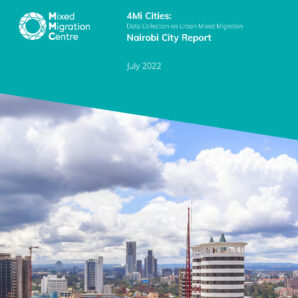4Mi Cities: Partnerships with City Governments Are Key To Better Data on Urban Mixed Migration
The 4Mi Cities Projects Reports
Most people who cross borders–including refugees fleeing persecution and conflict, victims of trafficking, and people seeking better lives and opportunities–do so to reach cities. An estimated 60 percent of refugees reside in cities and one in every five international migrants is estimated to live in just 20 cities around the world. Urban areas are increasingly becoming the primary destination for refugees and migrants, whether for permanent residence, temporary settlement ,or short-term transit. Given the growing trend of urban mixed migration, urban policies cannot ignore migration and migration policies cannot ignore urbanization. In other words, the future of global migration will be directly shaped by how effectively cities are equipped to address accelerating urbanization.
Reliable data on the profiles, needs, and preferences of refugees and migrants populations residing in cities is vital to effective urban migration policies. Recognizing this, the Marrakech Mayors Declaration on “Cities Working Together for Migrants and Refugees” – which stems from the adoption of the Global Compact for Migration and the Global Compact on Refugees–includes over 150 mayors and city governments that have committed to, “improving data collection and measurement of progress,” and calling on the international community, national governments, and the private sector to, “work with key international city networks to improve multilateral cooperation, implement local or joint programs, measure progress, and gather and share data with national and international actors.”
While research projects on mixed migration are commonplace among the international community, few heed the call of the Marrakech Mayors Declaration to work in direct and equal partnership with city governments on the design, collection, and analysis of research methodologies and the uptake of the data they produce.
This is where the Mayors Migration Council and Mixed Migration Centre’s (MMC²)’s 4Mi Cities project comes in. First working in close partnership with three city governments (Medellín and Barranquilla in Colombia, and Mexico City in Mexico), MMC² designed and implemented a pilot data collection project to better survey refugees’ and migrants’ urban experience to cultivate improved policy and service provision at the city government level.
The success of the initial pilot in modeling good partnerships for collecting, analyzing, and elevating data on a global level empowered MMC² to expand 4Mi Cities to East Africa, in partnership with the city governments of Arua and Kampala in Uganda and Nairobi in Kenya. These three cities have long provided for their fair share of migrants and refugees without proper research support to understand how they may improve their efforts.
Like many other urban centers, the six cities included in this project are hosts to refugee and migrant populations, including Venezuelan refugees and migrants from Central America. On the one hand, whether the cities represent an intended or final destination or not, they each offer migrant populations economic opportunities, access to services, and a diaspora community. On the other hand, barriers such as xenophobia and a lack of knowledge regarding available services and programs persist among migrant communities in all six cities. As grantees of the Mayors Migration Council’s Global Cities Fund for Migrants and Refugees (GCF), each of the three city governments in Latin America have deployed ongoing projects to meet refugees’ and migrants’ needs, but previously lacked the data to better understand how to expand these projects to serve as effective building blocks to the cities’ long-term migration policies, programs, and objectives.






